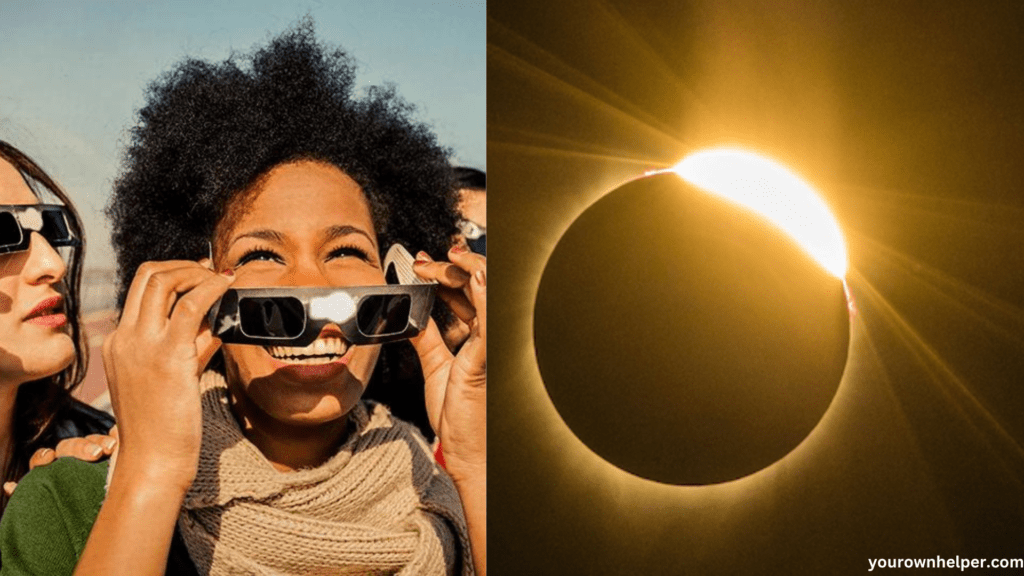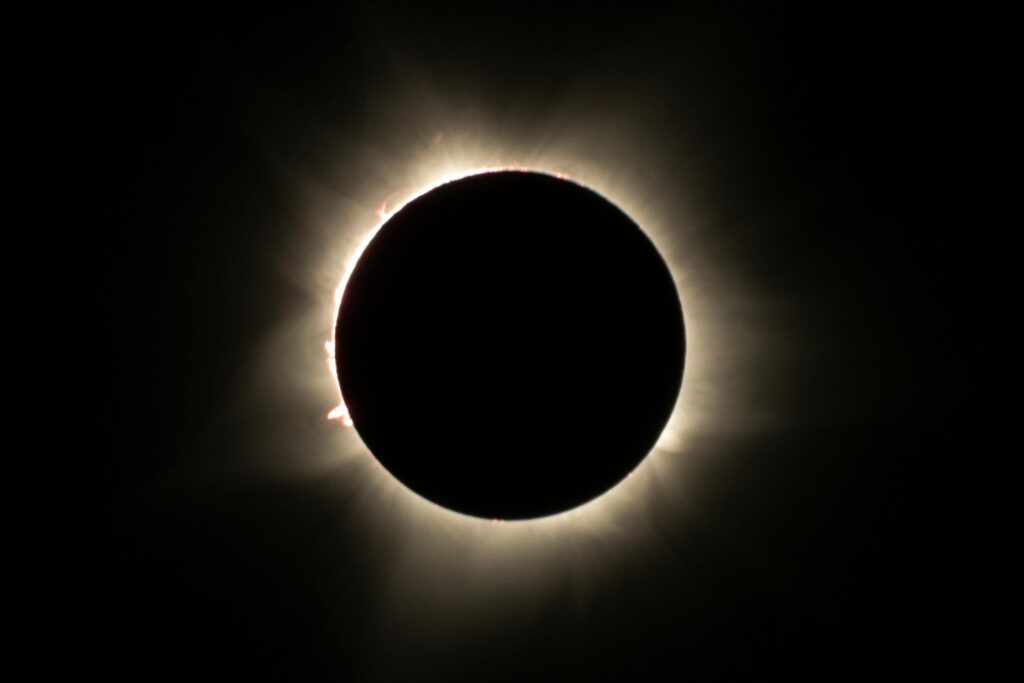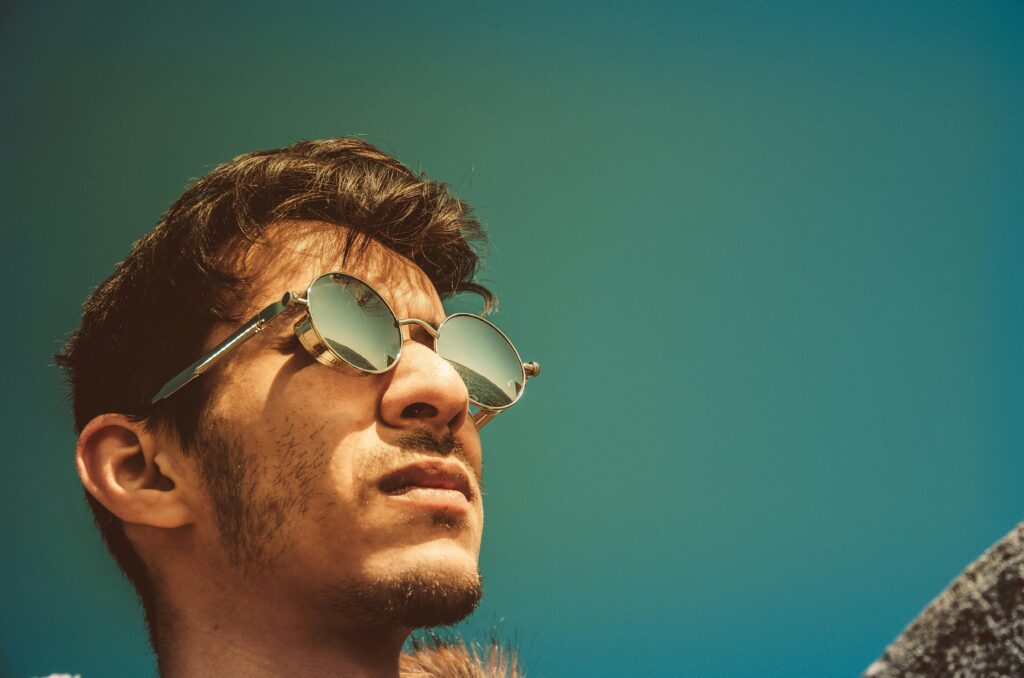
Introduction:solar eclipse
You’re just minding your own business one day when someone mentions the upcoming solar eclipse. Naturally you get excited who doesn’t love a good eclipse. But then your friend chimes in with a warning. “Don’t look directly at it or you’ll go blind!” Now you’re left wondering, Is that really true? Can staring at the sun during an eclipse leave you blind or is that just an old wives’ tale? Well, wonder no more! This article will give you the lowdown on solar eclipses and potential vision damage. We’ll explain exactly why you can go blind, how long it takes, what a solar eclipse really is, when the next one is coming, and how to view one safely. We’ll even answer some common questions people have about solar eclipse blindness. So keep reading to get the facts and protect your eyesight.
What Is a Solar Eclipse and why can you go blind from a solar eclipse?

The sun’s intense light
During a solar eclipse, the moon blocks the sun’s light from reaching parts of the Earth. The sun’s light is extremely intense, even during an eclipse, which is why you should never look directly at the sun. Staring at the sun can severely damage your retina, the light-sensitive layer of tissue at the back of your eye, causing permanent vision loss or even blindness.
Photochemical damage
Looking at the sun during an eclipse causes photochemical damage to the retina. The light sets off a chain reaction of chemical processes in the retinas, which can damage cells and scar tissue. This damage is frequently painless, so you may not notice your vision is being jeopardized until it’s too late. The harm occurs gradually, but the consequences are irrevocable.
The Dangers of Looking Directly at a Solar Eclipse
Looking directly at the sun during an eclipse can cause permanent damage to your eyes.During an eclipse, the moon blocks the sun’s disk, but the remaining exposed sliver of light is still intensely bright.
This brightness can seriously injure your retinas in just a few seconds.
The damage from sun exposure during eclipses builds up over time and frequently doesn’t create visible vision difficulties straight away. However, studies suggest that persistent exposure to intense sun radiation causes visual impairment and even blindness in later life. The damage to your eyes is generally painless, so you may be unaware that it is occurring.By the time symptoms manifest, the damage has already occurred.
The only time it is safe to look straight at the sun is during totality, when the moon totally hides the sun. However, the totality phase lasts only a few minutes at the most. To observe the eclipse safely at other times, you must use special sun filters or solar viewing glasses that fulfill the appropriate ISO safety standards.These glasses lower the sun’s brightness to an acceptable level for your eyes.
Regular sunglasses, exposed film, smoked glass, and similar materials are not suitable for viewing the sun and will not protect your eyes. The only method to safely observe an eclipse is to use special solar filters or viewing glasses, pinhole projectors, or telescopic projection.
Precautions to Take to Avoid Eclipse Blindness

Protect Your Eyes
The only safe way to look at the sun, eclipsed or not, is through special-purpose solar filters. Solar eclipses excite our visual curiosity, but looking at the sun during an eclipse can damage your eyes, Regular sunglasses are not strong enough to protect your eyes. during an eclipse. Look for eclipse glasses or handheld solar viewers that specifically. state they meet the ISO 12312-2 international safety standard for solar viewing. Always inspect your solar filters before use to ensure they are not damaged or torn.
Look Briefly
Even when using proper eye protection, don’t stare continuously at the eclipsed sun. Take breaks and give your eyes a chance to relax. While brief periods of viewing, even without protection, are unlikely to cause permanent harm, your eyes can be damaged without you realizing it at the time. Don’t take unnecessary risks.
Supervise Children
Keep a close watch on children during an eclipse. Their eyes are more sensitive, and kids.may not understand the importance of eye protection or know to avoid looking at the sun.Keep solar glasses on children at all times during viewing. Holding or carrying a child while viewing could allow them to remove their glasses without you noticing.
Photograph the Eclipse Safely
If you want to photograph the eclipse, use a camera on a tripod and a solar filter over the lens. Point and shoot cameras, Go Pros, and smartphones typically don’t have the optical zoom capabilities required for eclipse photography and often don’t work with filters. Never look through a camera lens without a solar filter, as concentrated light can still damage eyes.By following these precautions and using proper eye protection at all times during viewing, you can safely observe and enjoy the spectacular sight of a solar eclipse without risking eye damage or blindness.
But remember even brief unprotected viewing of the sun at any time, eclipse or not, can cause permanent vision impairment, so take every precaution and be vigilant. The reward of seeing an eclipse is not worth risking your eyesight.
What to Do if You Experience Vision Loss From an Eclipse
If you experience vision issues after viewing an eclipse, don’t panic-but do take action right away. The effects are usually temporary, but prompt treatment will help minimize damage and increase your chances of a full recovery.
See an Eye Doctor Immediately
As soon as you notice vision problems like blurred vision, dark spots, or blindness in one or both eyes after an eclipse, consult an ophthalmologist. They can examine your eyes for signs of photochemical damage to the retina, known as solar retinopathy. Early treatment. like steroids to reduce inflammation may help prevent permanent vision loss. The doctor may also recommend resting your eyes by avoiding visually demanding tasks.
Expect Vision Changes
Don’t be surprised if your vision seems off for a while. You may experience blurred vision, distorted vision, or blind spots, especially in the center of your visual field. Colors may also appear washed out or faded. These issues should start to gradually improve within a few hours to days as your retina recovers. However, severe damage can sometimes lead to permanent vision Impairment, so again, see an eye doctor right away.
Allow your eyes time to heal
Following your initial doctor appointment, the most important thing is to rest your eyes and allow them to recuperate. For about a week, avoid activities that need intense visual focus, such as reading, watching television, and using digital gadgets. Wear sunglasses outside to shield your eyes from harsh light. Your vision should return to normal within a week, although complete recovery may take a month or more in extreme situations. Follow-up eye exams will track your development and look for potential issues.
While viewing an eclipse can be an exciting celestial event, basic safety precautions must be taken to avoid vision injury. No matter how tempting, never look directly at the sun during an eclipse.Give your eyes enough rest after an eclipse, and if you develop vision problems, see an eye doctor right away your vision is not worth the risk.Better to be cautious than permanently sorry.
FAQ on Solar Eclipse Blindness:
How quickly can you go blind from looking at an eclipse?
Staring at the sun during an eclipse can cause permanent damage to your eyes very quickly. The sun’s rays are still intensely focused through the eclipse, and looking directly at the sun can cause solar retinopathy, damaging the retina. Vision loss and even blindness can occur in as little as 30 seconds.
When is the next solar eclipse in 2024?
The next total solar eclipse will cross the United States on April 8, 2024. The path of totality will stretch from Texas to Maine, passing through 13 states. Major cities like Dallas, Indianapolis, Cleveland, and New York City will experience a total solar eclipse. If you missed the 2017 Great American Eclipse, the 2024 eclipse is another chance to witness this spectacular celestial event.
Is eclipse blindness permanent?
Damage to the retina from sun gazing during an eclipse can often be permanent, though some vision may return over time. The severity depends on how long you looked at the sun. Milder cases may recover partially, but central vision loss can be permanent. There is no treatment or cure for solar retinopathy. The damage cannot be reversed, so prevention. Is key.
Quick view:
•Never look directly at the sun, even during an eclipse. Use protective eclipse glasses or solar viewers that meet ISO standards.
•The only time It’s safe to view the sun directly is during the brief total phase of a total solar eclipse (“totality”), when the moon completely covers the sun. But you still need proper eye protection before and after totality.
•If you notice vision problems after viewing an eclipse, see an eye doctor immediately for an exam. While treatment options are limited, prompt diagnosis and care are important to prevent further vision loss.
•Public warnings about the dangers of sun gazing during eclipses did not emerge until the mid-20th century. Before that, many people suffered vision damage from eclipses, not realizing the risks. Now we know better never look directly at the sun.
Conclusion:
So don’t worry too much about going blind during the 2024 eclipse. Simply make sure to take the necessary precautions, such as wearing certified eclipse glasses or utilizing a pinhole projector. Looking directly at the sun is never a good idea, eclipse or not.If you develop visual problems subsequently, visit an eye doctor soon away. But odds are, you’ll be fine. Simply observe the safety precautions, take in the beauty of the eclipse, and don’t panic.This celestial event occurs only once every few years, so take advantage of the unique opportunity to see a solar eclipse! You now know what to expect in 2024, when the moon’s shadow will pass North America again.
